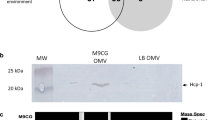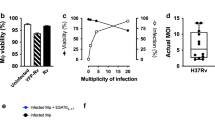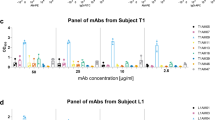Abstract
Leprosy is a chronic infectious disease caused by Mycobacterium leprae. As with other intracellular parasites, protective immunity is dependent on T cells and cell-mediated immunity1. In animal models, immunization with killed armadillo-derived M. leprae elicits strong T-cell responses, delayed-type hypersensitivity and protection against viable challenge2–5. We have recently shown that killed M. leprae can induce delayed-type hypersensitivity in healthy human volunteers6. Identification of the M. leprae antigens that are recognized by T cells and may be involved in protection has been hampered by the inability to cultivate the organism in vitro and by difficulties in antigen purification from limited quantities of armadillo-derived bacillus. Because genes for the major protein antigens of M. leprae as seen by mouse monoclonal antibodies have been isolated7,8, it has become possible to test whether these individual antigens are recognized by T cells. We screened crude λ gtll phage lysates of Escherichia coli containing individual M. leprae antigens using M. leprae-specific T-cell clones isolated from M. leprae-vaccinated volunteers. Using this method, we find that nearly half of the M. leprae-specific T-cell clones are stimulated to proliferate by lysates containing an epitope of a M. leprae protein of relative molecular mass 18,000 (18K).
This is a preview of subscription content, access via your institution
Access options
Subscribe to this journal
Receive 51 print issues and online access
$199.00 per year
only $3.90 per issue
Buy this article
- Purchase on Springer Link
- Instant access to full article PDF
Prices may be subject to local taxes which are calculated during checkout
Similar content being viewed by others
References
Bloom, B. R. & Godal, T. Rev. infect. Dis. 5, 765–780 (1983).
Shepard, C. C. Int. J. Lepr. 44, 222–226 (1976).
Patel, P. J. & Lefford, M. J. Infect. Immun. 19, 87–93 (1978).
Mehra, V. & Bloom, B. R. Infect. Immun. 23, 787–794 (1979).
Shepard, C. C., Van Landingham, R. & Walker, L. L. Infect. Immun. 29, 1034–1039 (1980).
Gill, H. K., Mustafa, A. S. & Godal, T. Bull. Wld Hlth Org. (in the press).
Young, R. A. et al. Nature 316, 450–452 (1985).
Engers, H. et al. Infect. Immun. 48, 603–605 (1985).
Britton, W. J., Hellqvist, L., Basten, A. & Raison, R. L. J. Immun. (in the press).
Huynh, T. V., Young, R. A. & Davis, R. W. in DNA Cloning Techniques: A Practical Approach (ed. Glover, D.) (IRL Press, Oxford, in the press).
Qvigstad, E., Digranes, S. & Thorsby, E. Scand. J. Immun. 18, 291–297 (1983).
Stanford, J. L. et al. Lepr. Rev. 51, 303–314 (1980).
Mustafa, A. S. & Godal, T. Clin. exp. Immun. 52, 29–37 (1983).
Author information
Authors and Affiliations
Rights and permissions
About this article
Cite this article
Mustafa, A., Gill, H., Nerland, A. et al. Human T-cell clones recognize a major M. leprae protein antigen expressed in E. coli. Nature 319, 63–66 (1986). https://doi.org/10.1038/319063a0
Received:
Accepted:
Issue Date:
DOI: https://doi.org/10.1038/319063a0
This article is cited by
-
Identification of a Mycobacterium leprae‐specific T cell epitope on the 70 kDa heat shock protein
Immunology & Cell Biology (1994)
-
Expression of the 18kDa protein of Mycobacterium leprae in Saccharomyces cerevisiae
Biotechnology Letters (1994)
Comments
By submitting a comment you agree to abide by our Terms and Community Guidelines. If you find something abusive or that does not comply with our terms or guidelines please flag it as inappropriate.



